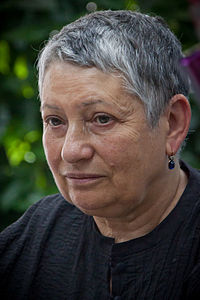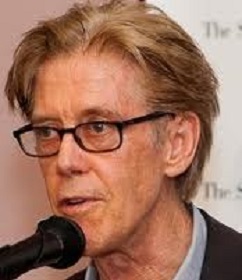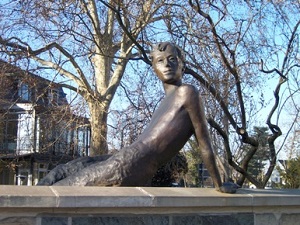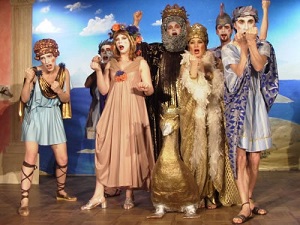De Russische schrijfster Ljoedmila Jevgenjevna Oelitskaja werd geboren in Davlenkanovo, Basjkirostan, op 23 februari 1943. Oelitskaja groeide op in Moskou, waar ze biologie studeerde aan de Universiteit van Moskou. Daarna werkte ze aan het Academie-instituut in Moskou als wetenschapster op het terrein van de genetica en biochemie. Oelitskaja begon haar literaire carrière in de jaren tachtig als schrijfster voor het ‘Joods Theater’ en als scenarioschrijfster voor de film. Haar eerste novelle, Sonetjska (1992), was meteen een groot succes en de start van een snelle literaire carrière, ook internationaal. Haar bekendste roman is “Reis naar de zevende hemel” uit 2002: de geschiedenis van de Russische artsenfamilie Koekotski, een verhaal waarin het begrip vrijheid op alle mogelijke manieren centraal staat. Oelitskaja’s boeken werden in vele landen vertaald, ook in het Nederlands. Haar werk werd ook veelvuldig onderscheiden, onder meer met de Russische Bookerprijs (2002), de Orde van de Academische Palmen (2003), de Orde van Kunst en Letteren (2004) en de Man Booker International Prize (2009).
Uit:The Funeral Party (Vertaald door Cathy Porter)
“Something had happened to Alik’s vision. Things disappeared and sharpened simultaneously. Densities altered and expanded. The faces of his friends became liquid, and objects flowing. But this flowing was pleasant rather than unpleasant, and revealed the connections between them in a new way. The corner of the room was cut off by an old ski, from which the dingy white walls ran off cheerfully in all directions. These undulations were halted by a female figure sitting cross-legged on the floor, touching the wall with the back of her head. This point, where her head touched the wall, was the most stable part of the picture.
Someone had raised the blinds and the light fell on the dark liquids in the bottles, shining green and gold on the window-sill. The liquids stood at different levels, and this xylophone of bottles suddenly recalled a youthful dream. In those years he had painted many still lifes with bottles. Thousands of bottles. Maybe more than he had drunk. No, he had drunk more. He smiled and closed his eyes.
But the bottles didn’t go away: they stood there palely, like waving columns on the other side of his eyelids. He realized that this was important. The realization crept in slowly and hugely, like a loose cloud. Bottles, bottle rhythms. Music sounded. Scriabin’s light-music. This had turned out on closer study to be thin, mechanical rubbish. He had gone on to learn about optics and acoustics, but these hadn’t been the key to anything either. His still lifes weren’t bad, just utterly irrelevant: he hadn’t discovered the metaphysical still lifes of Morandi yet.
All those paintings had been blown away in the wind; none were left now apart from a few in Petersburg maybe, stored by his friends there, or by the Kazantsevs in Moscow. God, how they used to drink in those days. They had collected the bottles, taking back the ordinary empties, but the foreign ones and the old ones of coloured glass they kept.
The bottles standing on the tin flap which edged the roof of the Kazantsevs’ house in Moscow were Czech beer-bottles of dark glass. No one could remember who had put them up there. In the Kazantsevs’ kitchen was a low door leading up to the attic, and from the attic a window opened on to the roof. Irina once darted out of this window and ran across the roof. There was nothing unusual about this, they were forever running on to the roof to dance and sunbathe.”

Ljoedmila Oelitskaja (Davlenkanovo, 23 februari 1943)




